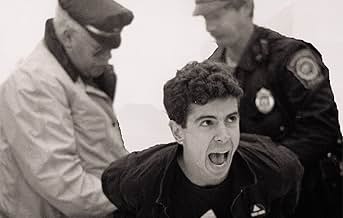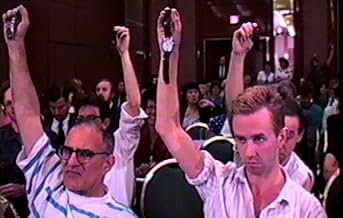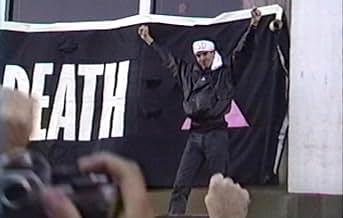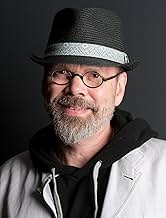AVALIAÇÃO DA IMDb
7,6/10
4,5 mil
SUA AVALIAÇÃO
Adicionar um enredo no seu idiomaThe story of two coalitions -- ACT UP and TAG (Treatment Action Group) -- whose activism and innovation turned AIDS from a death sentence into a manageable condition.The story of two coalitions -- ACT UP and TAG (Treatment Action Group) -- whose activism and innovation turned AIDS from a death sentence into a manageable condition.The story of two coalitions -- ACT UP and TAG (Treatment Action Group) -- whose activism and innovation turned AIDS from a death sentence into a manageable condition.
- Direção
- Roteiristas
- Artistas
- Indicado a 1 Oscar
- 13 vitórias e 21 indicações no total
Iris Long
- Self - Retired Chemist
- (cenas de arquivo)
- (as Iris Long PHD)
Bob Rafsky
- Self - PR Executive
- (cenas de arquivo)
Ed Koch
- Self - Mayor of New York
- (cenas de arquivo)
Barbara Starrett
- Self - AIDS Physician
- (as Dr. Barbara Starrett)
Franke-Ruta Garance
- Self - Teenager
- (as Garance Franke-Ruta)
Mathilde Krim
- Self - AMFAR, The Foundation for AIDS Research
- (as Mathilde Krim PHD)
Jesse Helms
- Self - R - North Carolina
- (cenas de arquivo)
Avaliações em destaque
I really don't understand how this doco only scores a 7.3. It's the most compelling piece of film I have seen in years, I was gripped from the beginning to the end. It is basically about the early fight for treatment research and recognition that HIV sufferers have a disease and were entitled to respect and humanity from the wider community as it was not a punishment from God for a so called "lifestyle choice".
It is structured by piecing together a lot of archive film that is edited so brilliantly that it like watching a scripted film that tells a great story, a film with real stars and characters. The subject matter is based on HIV but what I took away from the film is how people with such a motivation did "act up" and used democracy to achieve an objective. It is compulsive viewing for any interested in any type of campaigning.
My only criticism of the film is it did not fully explore the reason for the early antagonism toward people with the virus and why the medical establishment and governments at that time were slow to act. But in the end I seen a film about a story I did not know about, a story about successful democratic campaign that has saved millions of lives. I now think these early campaigners should have got Nobel recognition. The film is that powerful.
It is structured by piecing together a lot of archive film that is edited so brilliantly that it like watching a scripted film that tells a great story, a film with real stars and characters. The subject matter is based on HIV but what I took away from the film is how people with such a motivation did "act up" and used democracy to achieve an objective. It is compulsive viewing for any interested in any type of campaigning.
My only criticism of the film is it did not fully explore the reason for the early antagonism toward people with the virus and why the medical establishment and governments at that time were slow to act. But in the end I seen a film about a story I did not know about, a story about successful democratic campaign that has saved millions of lives. I now think these early campaigners should have got Nobel recognition. The film is that powerful.
¨Act Up. Fight Back. Fight AIDS.¨
Director David France does an impressive job of gathering information, data, news footage, and home videos during the decade long fight of the activist group known as ACT UP to find a way to stop the AIDS epidemic in this well constructed documentary. The film succeeds in showing us the anger and outrage that these men went through to stop government inaction on such a widespread plague that was killing off millions of people in the world. I was impressed with this chronological history that David France was able to put together in a brilliant way. My only complaint is that some things were repetitive as we see one rally after another in protest against the government. ACT UP assembled to fight and protest against the little support given by the Reagan and Bush administration, against the FDA which was taking too long to approve drugs that several patients needed, and the Catholic Church which condemned them. The documentary is full of anger, and there are several emotional moments as we see what some of these men had to go through in their struggle with the disease. During the 80's having AIDS meant you had almost a 100% chance of dying; it was practically a death sentence. This made the homophobic atmosphere grow in communities where several hospitals neglected to give these patients health care. France follows the activist group, ACT UP, from its forming moments to its divisive ones, and finally to the goals they accomplished through some breakthroughs. It was not an easy fight, but their voice was heard. This is the story of how some of these men were able to survive the plague.
The story begins six years after the AIDS epidemic has begun to spread. It's 1987 and a group of activists known as ACT UP decide to get together in New York City to protest against the way the AIDS epidemic has been treated. They form a coalition for healthcare after over half a million people had died of AIDS around the world. We follow the protests taking place against some government officials and the activists finally begin to get their voiced heard. David France isn't afraid of sharing some strong images with the viewer as he shows everything in a very raw manner. Their next rallies take place over the country protesting against gay hate, and later we see them protest against the FDA for taking too much time to approve drugs. This leads some of the activists to begin receiving some underground drug treatments in order to try to expand their life as the sickness begins taking a toll on them. They begin to study and discover what the disease really was and fight for possible solutions as they form committees in order to understand AIDS better. They also form support groups for those people who had fear of coming out during that dangerous time. They studied several ways to slow down the virus, but as time passed more and more deaths were taking place. The film follows the decade long fight of ACT UP from 1987 to 1996 where they finally reached a breakthrough, although it came at a great cost.
Some of the important things the AIDS community accomplished were rising consciousness of what the disease really was, they made AIDS become an important issue during the 1992 presidential campaign, and they finally found drugs that helped slow down the effects of the virus. It wasn't an easy fight as we feel the anger some of these men had towards the ineptness of the government of the time and the loss of some of their close friends and relatives. This was a very insightful story and part of American history that needed to be told. France did an excellent job at putting together all the footage and delivering a powerful and emotional documentary. It did drag a little, but it was a strong film.
http://estebueno10.blogspot.com/
Director David France does an impressive job of gathering information, data, news footage, and home videos during the decade long fight of the activist group known as ACT UP to find a way to stop the AIDS epidemic in this well constructed documentary. The film succeeds in showing us the anger and outrage that these men went through to stop government inaction on such a widespread plague that was killing off millions of people in the world. I was impressed with this chronological history that David France was able to put together in a brilliant way. My only complaint is that some things were repetitive as we see one rally after another in protest against the government. ACT UP assembled to fight and protest against the little support given by the Reagan and Bush administration, against the FDA which was taking too long to approve drugs that several patients needed, and the Catholic Church which condemned them. The documentary is full of anger, and there are several emotional moments as we see what some of these men had to go through in their struggle with the disease. During the 80's having AIDS meant you had almost a 100% chance of dying; it was practically a death sentence. This made the homophobic atmosphere grow in communities where several hospitals neglected to give these patients health care. France follows the activist group, ACT UP, from its forming moments to its divisive ones, and finally to the goals they accomplished through some breakthroughs. It was not an easy fight, but their voice was heard. This is the story of how some of these men were able to survive the plague.
The story begins six years after the AIDS epidemic has begun to spread. It's 1987 and a group of activists known as ACT UP decide to get together in New York City to protest against the way the AIDS epidemic has been treated. They form a coalition for healthcare after over half a million people had died of AIDS around the world. We follow the protests taking place against some government officials and the activists finally begin to get their voiced heard. David France isn't afraid of sharing some strong images with the viewer as he shows everything in a very raw manner. Their next rallies take place over the country protesting against gay hate, and later we see them protest against the FDA for taking too much time to approve drugs. This leads some of the activists to begin receiving some underground drug treatments in order to try to expand their life as the sickness begins taking a toll on them. They begin to study and discover what the disease really was and fight for possible solutions as they form committees in order to understand AIDS better. They also form support groups for those people who had fear of coming out during that dangerous time. They studied several ways to slow down the virus, but as time passed more and more deaths were taking place. The film follows the decade long fight of ACT UP from 1987 to 1996 where they finally reached a breakthrough, although it came at a great cost.
Some of the important things the AIDS community accomplished were rising consciousness of what the disease really was, they made AIDS become an important issue during the 1992 presidential campaign, and they finally found drugs that helped slow down the effects of the virus. It wasn't an easy fight as we feel the anger some of these men had towards the ineptness of the government of the time and the loss of some of their close friends and relatives. This was a very insightful story and part of American history that needed to be told. France did an excellent job at putting together all the footage and delivering a powerful and emotional documentary. It did drag a little, but it was a strong film.
http://estebueno10.blogspot.com/
"How to Survive a Plague" is a gripping documentary that tracks down the chronological history of HIV and AIDS, from its onset in the early 80's to today. During the 80's, it was actually a plague killing millions of people. The documentary focuses on two advocacy groups ACT and TAG, and their tireless work for decades to persuade U.S. governments to allocate more funds for AIDS research and medicine. Their efforts helped turn AIDS from a fatal disease to a manageable condition. This documentary might be hard to survive through; not because of any inadequacy but because of the frightful scenes showing how many young people with bright futures died from AIDS. Director David France proficiently exhibits the work of ACT and later TAG from its very beginnings, and then finalizes it showing several ACT & TAG members today in how they were able to survive AIDS. These brave & honorable men practically saved their own lives with their advocacy efforts, and that is one ACT that if hard to follow. OK, now TAG, you are it. Because it is your turn to get educated with France's love letter to ACT & TAG with a "How to Survive a Plague" viewing. **** Good
Seeing this title I was expecting something of an apocalyptic, end-of- the-world zombie type film. In fact, this documentary was far truer, exploring a disease which has cost many lives. One might say I have an interest in LGBT causes and maybe this is why I decided to see this documentary, but AIDS is not exclusive to any community.
This documentary starts in the early 80's in New York where young men and women are dying of AIDS. There is no treatment and they are even refused in the hospitals. Each with their individual pain couldn't do much so they organized and created "ACT UP" whose main focus was to be an activist group, which through civil disobedience would bring attention, awareness, and most importantly a cure to AIDS. The documentary retraces some of their fights and quarrels mostly through archives but also with some more recent interviews. It covers some of the darkest hours before the discovery of the lucky combination that would prolong the lives of many, but would come too late to save those of many more.
I think the topic is one of the most important there is. It feels so distant but I can actually remember hearing about a treatment to AIDS back then. It meant very little to me at the time. I can't say that I really loved the way the documentary was going about things but I liked the substance very much. It is very scary to think back and imagine those people taking whatever medication that was on trial simply because at that point it couldn't have done more harm.
While I think activism is double-edged blade and can sometimes backfire, it seems that this very activism has saved many lives and the alerted politicians who at first refused to talk about how many lives AIDS had taken. There are some very emotional personal stories here, and if my rating was based solely on the people in this documentary, I'd give them all a 10 for their courage and perseverance through this tremendous pain.
I liked: The topic. Historically important.
I disliked: The shaky archive footage, the constant shouting and confrontations. It had only one sequence to explain the actual biological/chemical aspects, which I felt were important and deserved more screen time.
74/100 A little over 20 years ago, there were presidents who would go on television and say that AIDS has behavioral causes that should be looked at. This documentary could definitely teach them a thing or two.
This documentary starts in the early 80's in New York where young men and women are dying of AIDS. There is no treatment and they are even refused in the hospitals. Each with their individual pain couldn't do much so they organized and created "ACT UP" whose main focus was to be an activist group, which through civil disobedience would bring attention, awareness, and most importantly a cure to AIDS. The documentary retraces some of their fights and quarrels mostly through archives but also with some more recent interviews. It covers some of the darkest hours before the discovery of the lucky combination that would prolong the lives of many, but would come too late to save those of many more.
I think the topic is one of the most important there is. It feels so distant but I can actually remember hearing about a treatment to AIDS back then. It meant very little to me at the time. I can't say that I really loved the way the documentary was going about things but I liked the substance very much. It is very scary to think back and imagine those people taking whatever medication that was on trial simply because at that point it couldn't have done more harm.
While I think activism is double-edged blade and can sometimes backfire, it seems that this very activism has saved many lives and the alerted politicians who at first refused to talk about how many lives AIDS had taken. There are some very emotional personal stories here, and if my rating was based solely on the people in this documentary, I'd give them all a 10 for their courage and perseverance through this tremendous pain.
I liked: The topic. Historically important.
I disliked: The shaky archive footage, the constant shouting and confrontations. It had only one sequence to explain the actual biological/chemical aspects, which I felt were important and deserved more screen time.
74/100 A little over 20 years ago, there were presidents who would go on television and say that AIDS has behavioral causes that should be looked at. This documentary could definitely teach them a thing or two.
This film is recommended.
David France's documentary, How To Survive A Plague, chronicles the devastating effect of AIDS upon the gay community from the mid eighties to present day. Through archival footage and direct interviews with activists and patients who fought against government bureaucracy, homophobia, and ignorance, the film also shows the history and political beginnings of gay, lesbian, and trans-genders who formed a group called ACT UP. This organization courageously battled the FDA, pharmaceutical companies, politicians, and hate- mongers, like Jesse Helms and his ilk, to try to stop this disease from reaching epidemic proportions with protest marches, sit-ins, and angry demonstrations to make the world aware of the severity of the problem.
The film covers nearly two decades of public outcry and disdain for the lack of tolerance and expediency in preventing this scourge. At times, the documentary shows some of the protests against various institutions like the Roman Catholic Church, Ronald Reagan and George Bush, and Congress in sketchy terms with some details lacking. But in general, the film succeeds in painting a clear picture of these average citizens forced to become activists due to a lack of insight and compassion from those in power, those elected officials who chose to look the other way until the disease started to target the general public.
How To Survive A Plague is an angry film, as well it should be. It profiles these heroic people whom continually found strength in each other while losing friends and loved ones in the process. This historic film helps to set the record straight as it shows their tragic tales without any bias or grandstanding. How To Survive A Plague becomes a life-affirming testament for those that lived and those that survived in the struggle against adversity and bigotry while keeping its focus on the dignity of a human life and a sense of equality and justice for all. GRADE: B
Visit my blog at: www.dearmoviegoer.com
ANY COMMENTS: Please contact me at: jadepietro@rcn.com
NOTE: Although a cure has been found to delay the fatality of this disease, the cost factor remains exorbitantly high for most average middle-class people. And so the fight continues...
David France's documentary, How To Survive A Plague, chronicles the devastating effect of AIDS upon the gay community from the mid eighties to present day. Through archival footage and direct interviews with activists and patients who fought against government bureaucracy, homophobia, and ignorance, the film also shows the history and political beginnings of gay, lesbian, and trans-genders who formed a group called ACT UP. This organization courageously battled the FDA, pharmaceutical companies, politicians, and hate- mongers, like Jesse Helms and his ilk, to try to stop this disease from reaching epidemic proportions with protest marches, sit-ins, and angry demonstrations to make the world aware of the severity of the problem.
The film covers nearly two decades of public outcry and disdain for the lack of tolerance and expediency in preventing this scourge. At times, the documentary shows some of the protests against various institutions like the Roman Catholic Church, Ronald Reagan and George Bush, and Congress in sketchy terms with some details lacking. But in general, the film succeeds in painting a clear picture of these average citizens forced to become activists due to a lack of insight and compassion from those in power, those elected officials who chose to look the other way until the disease started to target the general public.
How To Survive A Plague is an angry film, as well it should be. It profiles these heroic people whom continually found strength in each other while losing friends and loved ones in the process. This historic film helps to set the record straight as it shows their tragic tales without any bias or grandstanding. How To Survive A Plague becomes a life-affirming testament for those that lived and those that survived in the struggle against adversity and bigotry while keeping its focus on the dignity of a human life and a sense of equality and justice for all. GRADE: B
Visit my blog at: www.dearmoviegoer.com
ANY COMMENTS: Please contact me at: jadepietro@rcn.com
NOTE: Although a cure has been found to delay the fatality of this disease, the cost factor remains exorbitantly high for most average middle-class people. And so the fight continues...
Você sabia?
- Citações
Larry Kramer: [addressing to an angry protester] Plague! We're in the middle of a fucking plague, and you behave like this? ACT UP has been taken over by a lunatic fringe!
- ConexõesFeatured in Cerimônia do Oscar 2013 (2013)
- Trilhas sonorasThat's Us/Wild Combination
Performed & Arranged by 'Superhuman Happiness'
Written by Arthur Russell (as Charles Arthur Russell Jr.) (ASCAP)
Courtesy of Domino Publishing Company Ltd.
Principais escolhas
Faça login para avaliar e ver a lista de recomendações personalizadas
- How long is How to Survive a Plague?Fornecido pela Alexa
Detalhes
- Data de lançamento
- País de origem
- Centrais de atendimento oficiais
- Idioma
- Também conhecido como
- Làm thế nào để sống sót trong bệnh dịch
- Empresas de produção
- Consulte mais créditos da empresa na IMDbPro
Bilheteria
- Faturamento bruto nos EUA e Canadá
- US$ 132.055
- Fim de semana de estreia nos EUA e Canadá
- US$ 28.250
- 23 de set. de 2012
- Faturamento bruto mundial
- US$ 132.055
Contribua para esta página
Sugerir uma alteração ou adicionar conteúdo ausente


















